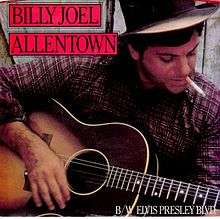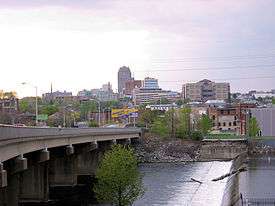Allentown (song)
| "Allentown" | ||||
|---|---|---|---|---|
 | ||||
| Single by Billy Joel | ||||
| from the album The Nylon Curtain | ||||
| B-side | "Elvis Presley Blvd." | |||
| Released | November 1982 | |||
| Format | 7" | |||
| Recorded | 1982 | |||
| Genre | Pop rock, soft rock | |||
| Length | 3:48 | |||
| Label | Columbia | |||
| Writer(s) | Billy Joel | |||
| Producer(s) | Phil Ramone | |||
| Billy Joel singles chronology | ||||
| ||||
"Allentown" is a song by American singer Billy Joel, which was the lead track on Joel's The Nylon Curtain (1982) album, accompanied by a conceptual music video. "Allentown" reached #17 on the Billboard Hot 100,[1] spending six consecutive weeks at that position and certified gold. Despite the song placing no higher than #17 on the weekly Billboard Hot 100 chart, it was popular enough to be placed at #43 on the Billboard year-end Hot 100 chart for 1983.
The song later appeared on Joel's Greatest Hits: Volume II (1985), Концерт (1987), 2000 Years: The Millennium Concert (2000), The Essential Billy Joel (2001), 12 Gardens Live (2006) and Live at Shea Stadium (2011) albums.
Upon its release, and especially in subsequent years, "Allentown" has emerged as an anthem of blue collar America, representing both the aspirations and frustrations of America's working class in the late 20th century.
Theme
The song's theme is of the resolve of those coping with the decline of the American manufacturing industry and the emergence of the rust belt in the latter part of the 20th century. More specifically, it depicts the depressed, blue-collar livelihood of residents of Allentown, Pennsylvania in the wake of Bethlehem Steel's decline and eventual closure.[1]
The rhythm heard in the introduction, "Hey" part of the chorus and ending is reminiscent of the sound of a rolling mill converting steel ingots into I-beams or other shapes. Such a sound was commonly heard throughout South Bethlehem when the Bethlehem Steel plant was in operation from 1857 through 1995. This gives the song an early industrial music influence in contrast to the prominent acoustic guitar and piano of the rest of the track.
Joel regarded the song as being "hopeful" towards the plight of the unemployed steel workers.[2] Even though the lyrics tell a sad tale, the singer is saying "We're not moving out or giving up...We're going to try."[2]
History
When Joel first started writing the song, it was originally named "Levittown", after the Long Island town right next to Hicksville, the town in which Joel had grown up. He had originally written a chord progression and lyrics for the song, but struggled for a topic for the song. Joel remembered reading about the decline of the steel industry in the Lehigh Valley, which included the cities of both Bethlehem and Allentown. While the steel industry was based in Bethlehem with none of it in Allentown, Joel named the song "Allentown" because it sounded better and it was easier to find other words to rhyme with "Allentown." Although Joel started writing the song in the late 1970s, it was not finished until 1982. The booklet in the 2-CD set Greatest Hits Volumes 1 and 2 lists the song as "copyrighted 1981" on page 17.[3]
A year after the song was released, the mayor of Allentown sent a letter to Joel about giving some of his royalties to the town. Mayor Joseph Daddona, who sent the letter, said it would help for scholarships for future musicians.[4] On January 20, 1983, the letter was mailed to Joel, and a local paper published an article on the subject the next day, quoting Daddona as saying the following:
Not only would this fund be a great way to share a tiny part of your good fortune to others in Allentown, it would also help keep alive the 'Allentown' song and the Billy Joel legend (which you've already become here).[4]
When Joel performed the song in Leningrad during the concert recorded and later released as Концерт, he introduced the song by analogizing the situation to that faced by Soviet youths:
This song is about young people living in the Northeast of America. Their lives are miserable because the steel factories are closing down. They desperately want to leave... but they stay because they were brought up to believe that things were going to get better. Maybe that sounds familiar.
Reaction to song in Allentown

The song was met with mixed responses in Allentown. Some criticized the song as degrading and full of working-class archetypes.[5] But when Joel returned to the area following the album's release and the song became a hit record, he was awarded the key to the city by Allentown's mayor, who praised it as "a gritty song about a gritty city."
Before a sold-out crowd at Stabler Arena in neighboring Bethlehem, People magazine reported that Joel was greeted enthusiastically with a five-minute standing ovation as he closed his third encore with "Allentown." At the end of the song and extended ovation, Joel was greeted with even more sustained applause when, in an apparent defense of the song's meaning, he pointedly told the Allentown crowd, as is his wont at the end of every one of his concerts: "Don't take any shit from anybody."[6]
Music video
The video, directed by Russell Mulcahy, was in heavy rotation on MTV during 1982 and 1983. The original version of the video features partial male nudity when male coal workers are taking a shower at the beginning, but that part was edited when it aired on MTV.
Chart performance
Weekly charts
|
Year-end charts
|
References
- 1 2 Dean, Maury (2003). Rock N' Roll Gold Rush. Algora. p. 289. ISBN 0-87586-207-1.
- 1 2 Campbell, Mary (October 30, 1982). "Bill Joel Uses Seven Fingers at the Piano". Daytona Beach Morning Journal. p. 12D. Retrieved 2016-04-12.
- ↑ Righi, Len (November 30, 2007). "Billy Joel revisits Allentown". The Morning Call. Retrieved 2008-08-08.
- 1 2 "Allentown mayor asks Joel for song royalties". Daily Collegian. Associated Press. January 21, 1983.
- ↑ Billy Joel Biography. billyjoel.com. Retrieved on December 7, 2008.
- ↑ Neuhaus, Cable. "He Sang of Their Troubles, but Grateful Citizens Say Thank You Anyway to Billy Joel". People. Retrieved 2008-06-08.
- ↑ "Top Singles". RPM. Library and Archives Canada. February 19, 1983. Retrieved July 5, 2015.
- ↑ "Cash Box Top 100 2/26/83". Tropicalglen.com. 1983-02-26. Retrieved 2016-10-25.
- ↑ "Top 100 Hits of 1983/Top 100 Songs of 1983". Musicoutfitters.com. Retrieved 2016-10-25.
- ↑ "Cash Box YE Pop Singles - 1983". Tropicalglen.com. 1983-12-31. Retrieved 2016-10-25.
External links
- "Allentown" music video at AOL.com.
- Billy Joel performs "Allentown" in Live from Leningrad, 1987, Saint Petersburg, Russia.
- "Billy Joel Revisits Allentown," Houston Chronicle, November 30, 2007.
- Lyrics of this song at MetroLyrics